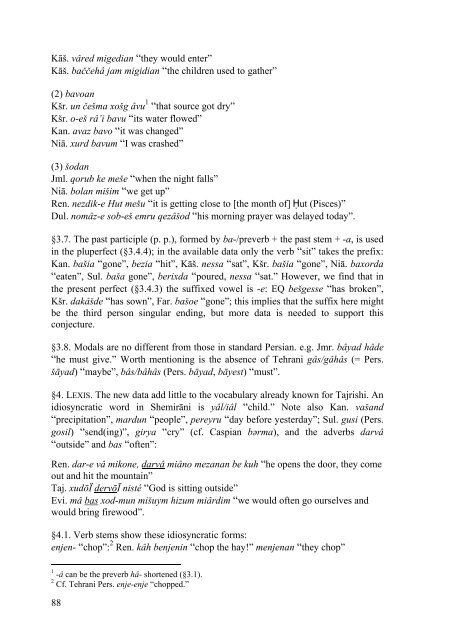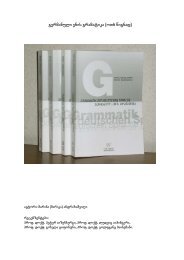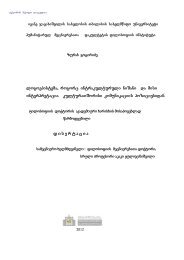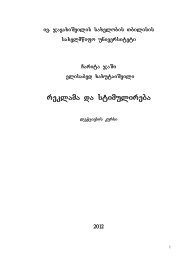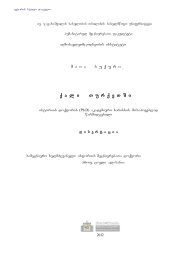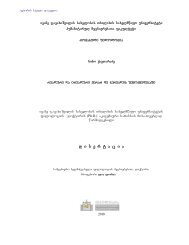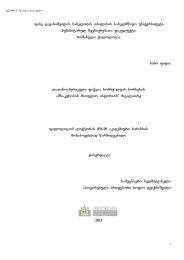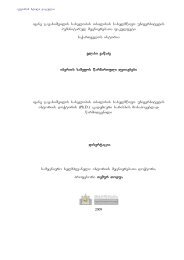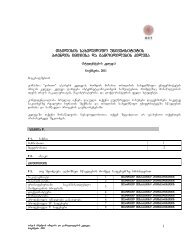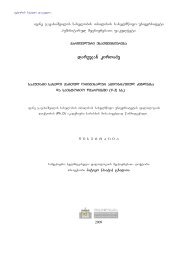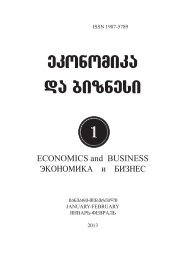issues of linguistics - Tbilisi State University
issues of linguistics - Tbilisi State University
issues of linguistics - Tbilisi State University
You also want an ePaper? Increase the reach of your titles
YUMPU automatically turns print PDFs into web optimized ePapers that Google loves.
Kāš. vâred migedian “they would enter”<br />
Kāš. baččehâ jam migidian “the children used to gather”<br />
(2) bavoan<br />
Kšr. un češma xošg âvu 1 “that source got dry”<br />
Kšr. o-eš râ’i bavu “its water flowed”<br />
Kan. avaz bavo “it was changed”<br />
Niā. xurd bavum “I was crashed”<br />
(3) šodan<br />
Jml. qorub ke meše “when the night falls”<br />
Niā. bolan mišim “we get up”<br />
Ren. nezdik-e Hut mešu “it is getting close to [the month <strong>of</strong>] Ḥut (Pisces)”<br />
Dul. nomâz-e sob-eš emru qezâšod “his morning prayer was delayed today”.<br />
§3.7. The past participle (p. p.), formed by ba-/preverb + the past stem + -a, is used<br />
in the pluperfect (§3.4.4); in the available data only the verb “sit” takes the prefix:<br />
Kan. bašia “gone”, bezia “hit”, Kāš. nessa “sat”, Kšr. bašia “gone”, Niā. baxorda<br />
“eaten”, Sul. baša gone”, berixda “poured, nessa “sat.” However, we find that in<br />
the present perfect (§3.4.3) the suffixed vowel is -e: EQ bešgesse “has broken”,<br />
Kšr. dakâšde “has sown”, Far. bašoe “gone”; this implies that the suffix here might<br />
be the third person singular ending, but more data is needed to support this<br />
conjecture.<br />
§3.8. Modals are no different from those in standard Persian. e.g. Jmr. bâyad hâde<br />
“he must give.” Worth mentioning is the absence <strong>of</strong> Tehrani gâs/gâhâs (= Pers.<br />
šāyad) “maybe”, bâs/bâhâs (Pers. bāyad, bāyest) “must”.<br />
§4. LEXIS. The new data add little to the vocabulary already known for Tajrishi. An<br />
idiosyncratic word in Shemirāni is yâl/iâl “child.” Note also Kan. vašand<br />
“precipitation”, mardun “people”, pereyru “day before yesterday”; Sul. gusi (Pers.<br />
gosil) “send(ing)”, girya “cry” (cf. Caspian bərma), and the adverbs darvâ<br />
“outside” and bas “<strong>of</strong>ten”:<br />
Ren. dar-e vâ mikone, darvâ miâno mezanan be kuh “he opens the door, they come<br />
out and hit the mountain”<br />
Taj. xudōÏ dervōÏ nisté “God is sitting outside”<br />
Evi. mâ bas xod-mun mišuym hizum miârdim “we would <strong>of</strong>ten go ourselves and<br />
would bring firewood”.<br />
§4.1. Verb stems show these idiosyncratic forms:<br />
enjen- “chop”: 2 Ren. kâh benjenin “chop the hay!” menjenan “they chop”<br />
1 -â can be the preverb hâ- shortened (§3.1).<br />
2 Cf. Tehrani Pers. enje-enje “chopped.”<br />
88


